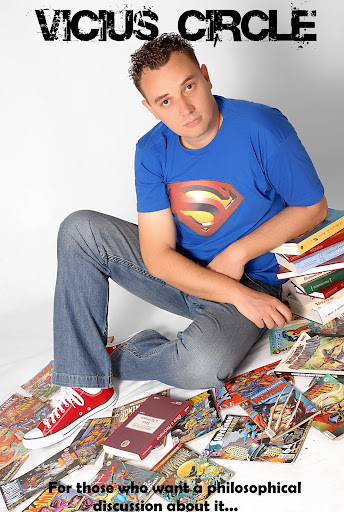Look at that guy in the leotard color there! Look, another jumping from building to building! Wow! He is struggling with a monster ... Well, for those unfamiliar with the universe is surprised of Super-Heroes, of course this is fictitious, but many are learning the secret that was kept alive for years by a group of fans of comics, the classic stories of the super- heroes, who are still being assessed today by a public increasingly interested in these stories, especially with the invasion of these super heroes on screen.
Every film released, a crowd is filling the theaters, the stalls packed with comics (comic books) and several products being marketed, with prints of superheroes. But what do these guys dressed up to become so popular? What they do to become so attractive?
One of the most remarkable developments in pop culture today is the strong resurgence of the superheroes as a cultural icon and entertainment, but these stories are not as innocent as they seem, they not only bring fun, is exposed in a sharp questions concerning ethics and morals, that whole 'being normal' faces in their day-to-day. These stories introduce and discuss the issues vividly paramount faced by humans, questions relating to ethics, personal and social responsibility, justice, crime and punishment, the mind and human emotions, personal identity, the soul, the notion of destiny, the meaning of our life, we think of science and nature, the role of faith in the harshness of this world, the importance of friendship, the meaning of love, the nature of a family, to the virtues classical and courage and many other topics. Why so many cling to the universe of superheroes and give wide audience to this issue. It was the Greeks who were the first to understand the causes hearing. According to the Greek philosopher Aristotle (384-322 BC), the experience (the plot on screen or reading a comic `s), strong feelings and tragic events, it was expected that people purify their own emotions, so does the viewer / reader reflect on the central problems of the human condition, the nature of fate or conflict between mercy and justice.
I imagine that no one looked at the stories of superheroes with a philosophical look.What? You still says it has nothing to do? Well, let's give some examples: everyone has heard the superhero Spider-Man, right?
Shortly after being bitten by a radioactive spider (in the movie a genetically altered spider), giving Peter Parker the power which he can turn into Spider-Man, Uncle Ben, feeling that there is something different about her nephew gives following advice: "With great power comes great responsibility." After the death of his Uncle Ben, this phrase, Peter Parker will take for the rest of his life as Spider-Man. This philosophically, is what philosophers Bentham (1748-1832) and Stuart Mill (1806-1873), called utilitarianism, where we are required to perform the action that produces greater common good. This is Spider-Man becomes a hero, saving lives, not using their powers to benefit themselves. This shows us that Peter Parker should be prepared to make personal sacrifices to fulfill their moral obligations. Utilitarians say we have no duty to do things that we can not, but that anyone who has special skills, should use them for the greater good.
But why do people save? Why risk their life fighting villains in the name of a greater good? The great German philosopher Kant (1724-1804), tells us that our primary duty is to act in a way that satisfies what he called the Categorical Imperative, a formula that dictates that we should always treat people as ends in themselves and not as mere means. But Kant also emphasizes that perform an action according to the categorical imperative is not enough for her to be good. In essence, the action must also be made for the right reasons, ie, Spider-Man should do it just because it is his duty. According to this interpretation, therefore, the intentions of our arachnid hero are relevant to the moral value of what it does.
Well, there's the example of the most famous stories of alien superheroes, Kryptonian name Kal-El or Clark Kent Earthman name, or as we all know, Superman. What a special guy like Kal-El / Clark Kent (Superman), you are doing in saving lives, instead of using his powers to their benefit, for example, using his great strength, squeezing a coal to achieve a diamond. Why it becomes a newspaper reporter, the 'Daily Planet'?Well, Kal-El/Clark Kent (Superman), would not prove much, what would be the reaction of people to know that he is an alien, and that could melt a car with a look of anger. Surely the people would be frightened by this kind of being. So Kal-El is hiding behind his glasses, hiding the identity of Clark Kent, being a citizen. Kal-El, knows he is not here, not of this world. It was created between humans, but actually is not one of us. Kal-El (Superman) is the sole survivor of his race. He is an alien, and feel very alone in this world, holding this heavy burden, his grand secret. And therein lies the key for his heroics. The basic desire to belong, to belong, is a fundamental aspect of human nature, our need to tap into the other is vital to our well-being. I assume that even if an alien, Kal-El feels the same basic need of the community.
But Kal-El, does not give back to his alien heritage, he knows that only when he uses his natural gifts of the Kryptonian race, it feels alive and engaged. Only when it acts at its full potential instead of hiding behind a pair of glasses, he participates in the truth of the world around them. Only when he is openly Kryptonian (Superman), it can be a man on earth, with exuberance and excellence. When he lives as the person really is, and applies its distinctive strengths in the service of others, he assumes his rightful place in the community, from which it is now part and in which she feels accomplished. It was no coincidence that when Aristotle sought to discover the root of happiness, he began to explore what it is to live with excellence. Superman, in his way, found the same relationship.
Since the X - men who are teenage mutants and, therefore, repugnant to normal human (as we did when we discriminate against someone), who fear and hate, trying - as the animals. But unlike normal humans, these young mutants do not hate them because of discrimination, by contrast, are struggling in these defenses. Aristotle explains this attitude of the X - men, by virtue ethics, where they lay their potential to achieve a common good.
Well, the Super-Heroes has much to say, so maybe that explains why the success in film making, and why they are so long on the market (Batman has more than 70 years, Superman almost 100 years) . The film adaptations as well as comics, the hero makes us seek within ourselves, not to be jumping from buildings or buildings in fighting crime, but doing a heroic act that can save our day.







